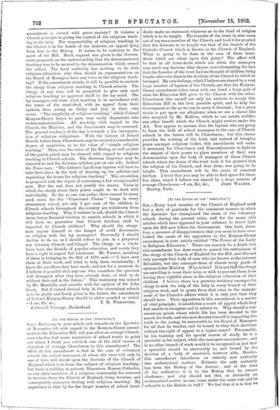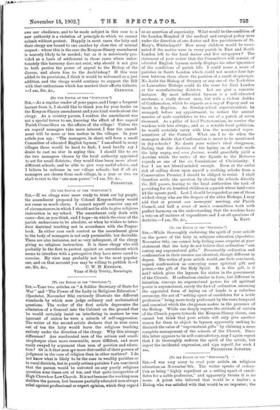LTo TUE EDITOR OF TUE " Sinici.iTort."1 SIR,—Every loyal member
of the Church of England must feel a debt of gratitude for the consistent manner in which the Spectator has championed the cause of the voluntary schools during the present crisis, and for the many able articles which have appeared in your columns to throw light upon the Bill now before the Government. One feels, there- fore, a measure of disappointment that you seem to have over- looked the cause of the opposition to the Kenyon-Slaney amendment in your article entitled " The Power of the Laity in Religious Education." There can scarcely be a doubt that this amendment has done much to quench the enthusiasm of the clergy of the Church of England for the Bill, and this not only amongst that body of men who are known as the extreme Ritualists, but also amongst those of almost eve g grade of opinion in her Ministry. :Why is this ? It is not thdt the clergy are unwilling to trust their laity, or wish to prevent them from having their rightful share in the religious education of their children. I believe there is a growing tendency amongst the clergy to seek the help of the laity in every branch of their religious work, and to grant them that voice in the manage- ment of the Church's affairs which it is only just that they should have. Their opposition to this amendment is a matter of vital principle; it establishes a court of appeal which they feel unable to recognise and to submit to. Why should a con- scientious priest, whose whole life has been devoted to the search for truth, and who now devotes himself to imparting this truth to the young, be answerable to his Board of Managers for all that he teaches, and be bound to obey their decisions without the right of appeal to a higher court? Presumably, by his training and his special course of study, he is a specialist in his subject, while the managers are amateurs; and in no other branch of work would it be recognised as just that a specialist should be answerable to, and bound by the decision of, a body of amateurs, however able. Besides, this amendment introduces an entirely new authority into ecclesiastical matters. Hitherto the only authority has been the Bishop of the diocese ; and at the time of his ordinat;o-a it is to the Bishop that be swears obedience; and why should not this, as distinctly an ecclesiastical matter as any, come under the same rule and be referable to the Bishop as well ? We feel that it is to him we
owe our obedience, and to be made subject in this case to a new authority is a violation of principle to which we cannot submit without protest. Happily in most cases the laity and their clergy are bound to one another by close ties of mutual respect : where this is the case the Kenyon-Slaney amendment is scarcely likely to be needed; but as it is notoriously pro- vided as a basis of settlement in those cases where unfor- tunately this harmony does not exist, why should it not give to both parties the power of appeal to the Bishop of the diocese, and above him to the Archbishop ? If this were added to its provisions, I think it would be welcomed as a just addition, and the clergy would continue to support the Bill with that enthusiasm which has marked their efforts hitherto.























































 Previous page
Previous page